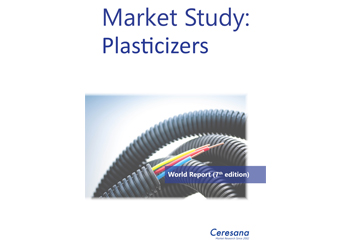

Plasticisers make life easier: chemicals are added to plastics, elastomers, paints and coatings, adhesives, and also, for example, textiles, deodorants and perfumes to make these materials soft, pliable, stretchable or easier to process.
These additives are among the best-selling chemicals of all: nearly 9 million tonnes are currently sold each year. Ceresana has already analysed the global market for plasticisers for the seventh time: market researchers expect demand for these indispensable additives to rise to a total of more than 11 million tonnes by 2032.
Plasticisers for flexible PVC
Asia-Pacific is by far the region with the highest sales of plasticisers. According to Ceresana's forecast, this region of the world, which accounts for almost two-thirds of plasticiser consumption today, will continue to record above-average growth rates in the coming years. Demand for plasticisers is also growing by more than 2 per cent per annum in Africa and the Middle East, while it is hardly growing at all in Western Europe.
Plasticisers are used primarily to make plastic products more pliable, soft and elastic. This application area alone currently requires almost 8 million tonnes per year. The inherently hard and brittle polyvinyl chloride, in particular, would often be useless without plasticisers: soft PVC consists of up to 50 per cent of plasticisers, Ceresana’s report notes. Plasticised PVC is processed, for example, into hoses, cables, seals, floor coverings and shoe soles. However, Ceresana expects the greatest growth in plasticiser demand to come from plastic films.
Increasing demand for alternatives to phthalates
If they are not firmly bound into other materials by copolymerisation, plasticisers can evaporate from the end products, wash out or be dispersed by abrasion of plastic particles. Phthalates, which are considered harmful to health and the environment, are now banned for many applications. In Europe, for example, they are banned for children's toys. Nevertheless, the most widely used type of plasticiser worldwide is still DEHP (bis(2-ethylhexyl) phthalate), with more than 3 million tonnes per year. The two phthalates DINP (diisononyl phthalate) and DIDP (diisodecyl phthalate) together still account for almost a third of the total plasticiser market. But more and more plastics processors are looking for more environmentally friendly alternatives: Ceresana analysts expect demand for phthalate-free plasticisers to increase to around 2.6 million tonnes.
Ceresana's new study analyses the global plasticisers market – providing forecasts up to 2032. The following plasticiser types are considered in detail: DEHP, DINP and DIDP, other phthalates, plasticisers without phthalates. The market report examines the various areas of application for plasticisers: profiles, films, cables, floorings, other plastics, elastomers, paints and coatings, adhesives. Key manufacturers include Arkema, BASF, Dow, Eastman Chemical Company, Evonik Industries, Kao Corporation, Lanxess, LG Chem, Mitsubishi Chemical Holdings Corporation, and Nan Ya Plastics Corp.
BLURB: Demand for plasticisers is also growing by more than 2 per cent per annum in Africa and the Middle East, while it is hardly growing at all in Western Europe.
